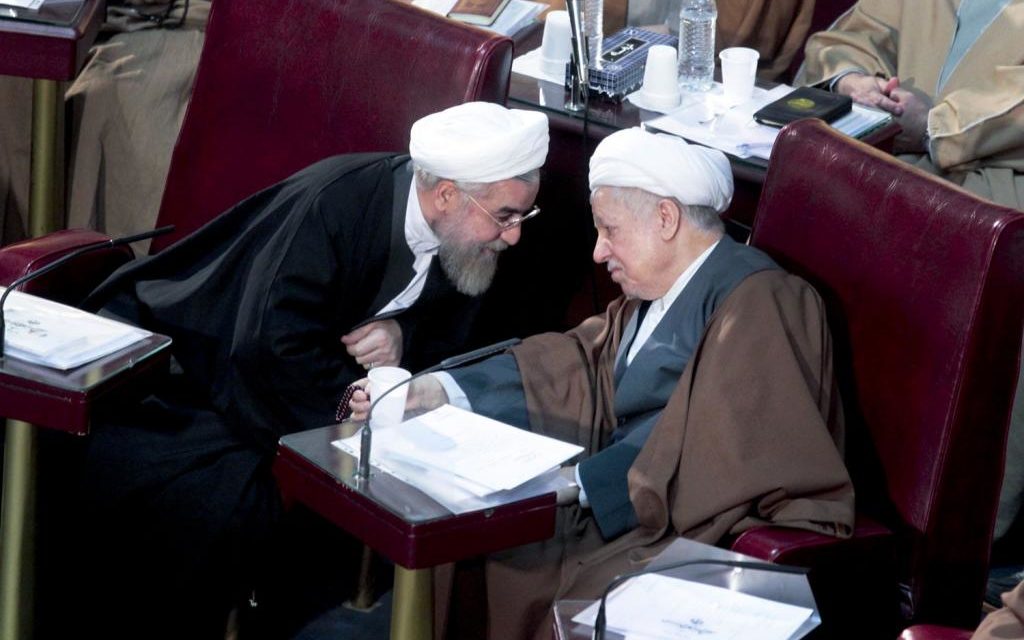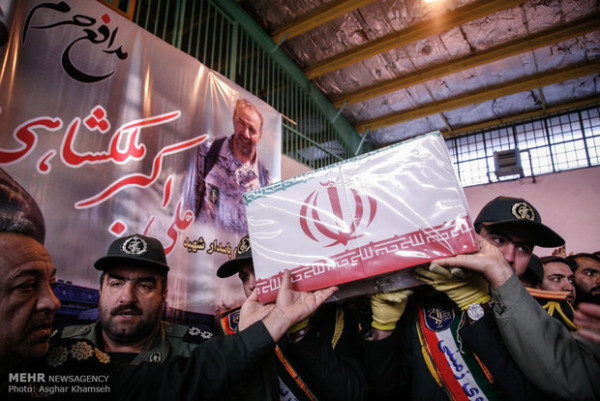PHOTO: President Rouhani with former President Hashemi Rafsanjani
LATEST
Iran’s President Rouhani has tried to ease regime in-fighting over former President Hashemi Rafsanjani, including his call for greater supervision of the actions of the Supreme Leader.
Rouhani intervened on Monday as he visited the registration office for February’s elections for Parliament and the Assembly of Experts, the body which chooses and can nominally replace the Supreme Leader:
The most important pillar of the Islamic Republic is the Supreme Leader. If today we have unity, solidarity, and coordination in our country and we can easily overcome the difficulties, it is due to the velayat-e faqih [guardianship of the jurist] and the Supreme Leader himself.
Rafsanjani stirred his long-running dispute with Iran’s hardliners last week when he called for the Assembly — which he led from 2007 to 2011 and which he is hoping to chair again — to exercise more authority. He also repeated his suggestion that a council should take over after the death of the current Leader, Ayatollah Khamenei.
The remarks were immediately attacked by the head of judiciary, Sadegh Larijani, as “baseless statements about the Assembly of Experts’ supervision over the Supreme Leadership and institutions”. The head of armed forces, General Hassan Firouzabadi, added on Friday:
The people who use this word [council] are the ones who cause trouble for Friday Prayer Leaders….[They are] those who…remained silent [regarding] the extremists deconstructing the sacred system of the Islamic Republic of Iran.
Iran Daily, Dec 19: Head of Armed Forces Attacks Former President Rafsanjani
Iran Daily, Dec 15: Rafsanjani Makes a Political Challenge
Firouzabadi’s deputy Masoud Jazayeri declared that the military had discovered a “serious plan against the model of the Supreme Leadership in the Islamic Revolution” with “some [Iranians]…who accompany the enemy’s plans”.
Undeterred, Rafsanjani applied some more pressure yesterday, saying the Assembly of Experts elections “must be healthy and lively”: “[This is] more necessary for the Assembly of Experts elections than the parliamentary elections….If the elections are not acceptable, this will blemish our Islamic political system.”
Rouhani also was cautious on Monday about his challenge to the powers of the Guardian Council to screen and disqualify candidates for the elections, although he appeared to call for a test through a large turnout of applicants:
All of those who consider themselves as righteous servants of people should come forth and register in the elections and do not pay attention to some concerns that are voiced here and there, because our country is the country of law and the Guardian Council undoubtedly will act based on law.
IMF: Iranian Economy Stagnant in 2015/16
The International Monetary Fund has projected that the Iranian economy will be stagnant in 2015/16, falling from a growth rate of about 3% to zero progress in the next year.
The IMF cites the sharp decline in global oil prices, tight corporate and bank balance sheets, and the postponement consumption and investment decisions ahead of the expected lifting of US and European sanctions.
The Fund also says that inflation is likely to remain at about 14%, despite smaller rises in the price of food and beverages.
Anticipating the removal of sanctions on Iran’s nuclear program, the IMF anticipates a growth of between 4 and 5.5% in 2016/17. It expects higher oil production, lower costs for trade and financial transactions, and restored access to foreign assets.
However, the Fund says this longer-term prospect is dependent on “the spillovers from increased oil production to the rest of the economy”.
Despite reducing the inflation from a rate of more than 45% in 2013, the Rouhani Government is facing a large budget deficit, a weakening currency, and continued problems in stimulation of production and investment. The President’s top economic advisor, Mohammad-Baqer Nobakht, warned last month that Iranians should anticipate continued recession, even if sanctions are removed.
The Government is anticipating that International Atomic Energy Agency verification of Iran’s compliance with the July 14 nuclear deal will be issued in January, starting the process of sanctions removal.
Six More Iranian Troops Killed in Syria
Iranian media confirmed the deaths of six troops in Syria on Sunday and Monday, including a colonel and a member of the Marine Special Forces.
No further details were given of the deaths, which bring the confirmed total since October 7 to 105. Among the casualties are eight Iranian commanders, including the overall commander of forces in Syria, General Hassan Hamedani.
The media also reported the funerals of another eight Iranian-led Afghan and Pakistani militia.
The funeral of Revoutionary Guards member Akbar Malek Shahi:


